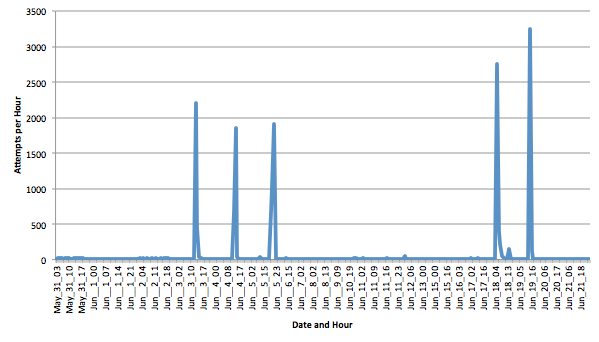SMTP Brute Forcing
Brute forcing SMTP credentials is hardly new. But I have seen a couple of odd patterns lately in one of my mail servers, and was wondering if anybody has any insight into these patterns. For this diary, I am using logs starting May 31st until today.
First, the overall patterns shows very strong spikes with 2000-3000 attempts per hour. These "spikes" usually come from many different IP addresses, so they are likely caused by a botnet probing my system. The last spike on June 19th was caused by about 400 different IP addresses (I am running fail2ban, and they are blocked after a couple of attempts).

The usernames are where it gets a bit more interesting. Here is a list of the top 20:
6096 leonelfetuscrosby 3595 dan 3399 ix444ejxvwda050 2763176 83 ncoppen 82 info 56 spam 53 admin 47 sales 34 abuse 28 paul 28 pager 26 test 23 support 21 awilloughby 20 webmaster 18 hr 18 d573697 17 help
The part that is of some concern is that a couple of the users are actual users of the server. The "ranking" goes somewhat by the amount of e-mail created by the user in general, so it is possible that spamers do try usernames they already have in their database against mail servers used by their domain. I don't capture passwords, but the number of attempts for most of the usernames is small, so I assume only a couple of passwords are used. The first and third name are odd as they look "random". Could they be used to detect if the mail server responds differently for users that do not exist?


Comments